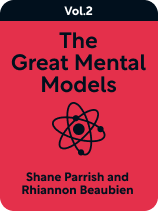

This article is an excerpt from the Shortform book guide to "The Great Mental Models Volume 2" by Shane Parrish and Rhiannon Beaubien. Shortform has the world's best summaries and analyses of books you should be reading.
Like this article? Sign up for a free trial here.
Where are you headed in life, and how fast are you going? What’s your niche? Should you be a generalist or a specialist?
If these questions resonate with you, you’re probably figuring out how you fit in the larger scheme of things. You have a unique combination of personality, strengths, and interests, which means that you have a unique place to thrive. Now you just need to get there.
Continue reading for tips on how to find your place in the world.
Finding Your Place
Authors Beaubien and Parrish offer a set of models that raise the possibility of thriving through divergence—finding your place in the world and choosing the best path to get you there.
Niches
Beaubien and Parrish argue that, if you want to thrive, you should find your niche—a specific role in the social environment that lets you capitalize on your strengths and maximize your chances of success. The authors argue that, to find the right niche, you should decide whether to be a generalist or a specialist. In biology, a niche refers to the function a species fulfills within its ecosystem. In this context, a generalist (like a raccoon) is a species that lives in a range of conditions and eats a variety of foods, whereas a specialist (like a koala) requires a specific habitat or food source.
The authors suggest that this model applies equally well to human competition, such as in the business world. In this context, a generalist business offers a wide range of products or services. Generalist businesses face fierce competition from other generalists in the same niche, but they’re also unlikely to go out of business as cultures and economies change. For example, big-box general merchandise stores like Walmart and Target are generalists because they offer one-stop shopping for groceries, home goods, clothing, electronics, and more.
By contrast, a specialist business focuses on developing a narrow niche that no one else can fill. Specialist businesses can dominate their small market niches, but they’re vulnerable to technological and cultural changes that alter that niche. For example, since 1950, the Nielsen Corporation has measured the viewership of US television programs and provided this data to networks and marketers. Thanks in part to its aggressive patenting of its technology, Nielsen historically faced no real competition. However, with the advent of streaming services, DVRs, and other technologies that have changed how people watch content, Nielsen’s accuracy has come into question and new competitors have begun to threaten Nielsen’s business model.
(Shortform note: Specialist niches might be especially valuable for companies who aren’t equipped for heavy competition. In Blue Ocean Strategy, W. Chan Kim and Renée Mauborgne describe competitive generalist markets as red oceans—that is, oceans that have been stained by blood from constant fighting. Kim and Mauborgne recommend that instead of jumping into a red ocean and trying to outcompete established businesses, you should seek a blue ocean, meaning a market where you’ll face little to no competition. They say you can do this by offering a uniquely valuable product or service—in other words, by finding or creating a specialist niche for yourself.)
In short, Beaubien and Parrish point out that generalizing and specializing both have their strengths and weaknesses—rather than promoting one over the other, they suggest learning which one best suits you so that you can strategize appropriately.
(Shortform note: Most of Beaubien and Parrish’s examples of niches relate to either technological evolution or business competition. But niches—and the question of generalization versus specialization—come up in a variety of everyday contexts, as well. For example, you could choose to pursue a wide range of hobbies (a generalist approach), or pick one or two and build your expertise in them (a specialist approach). Similarly, you could choose to read a variety of books or dive deep into a single favorite genre. The stakes of these decisions might not be as high as they are when choosing a business strategy, but the tradeoffs are similar—you always have to balance generalist breadth versus specialist depth.)
Velocity
Once you know where you want to be (for example, which niche you want to fill), you still have to figure out how to get there. That’s why Beaubien and Parrish offer the model of velocity—which suggests the importance of knowing where you’re going and not just how quickly you’re moving.
The authors explain that, although we often use the words “speed” and “velocity” interchangeably, in physics, the two terms have slightly different meanings. Speed is an object’s rate of movement expressed as distance divided by time (for example, miles per hour or meters per second). Velocity is an object’s rate of movement in a designated direction—for example, a car’s speed might be 80 mph, whereas its velocity is 80 mph west.
Beaubien and Parrish explain that the distinction between speed and velocity is important because, as a metaphor, velocity reminds us to choose our direction carefully to make sure we end up where we want to go. For example, cars in a NASCAR race go fast—around 200 mph on average—but they race mostly on oval-shaped circuits, meaning that all of that speed doesn’t actually get them anywhere.
Likewise, Beaubien and Parrish say, it’s entirely possible to spend all of your time and energy working hard (gaining speed) without actually moving closer to your goals. For example, if you really care about becoming a professional musician, then getting promoted to a managerial position in your office job might increase your speed without actually taking you in the direction you want. (Shortform note: In this sense, velocity is relative—for someone who cares about succeeding in business, the managerial promotion is progress whereas a record contract would be irrelevant.)
| How to Chart Your Course So, how do you choose your direction and stick to it? In Start With Why, Simon Sinek recommends that you begin with the motivating purpose behind your actions. Although Sinek talks specifically about businesses, this approach is equally valuable on a personal level. When you think not just about what you do but also about why you do it, you’ll find it easier to make choices that line up with your chosen purpose. In other words, starting with why is like having a compass—your why will always let you know whether you’re pointed in the right direction. Unfortunately, it’s not always easy to determine which actions will take you in that chosen direction. That’s why, in The One Thing, Gary Keller suggests that you take the time to determine the one action that matters most to your goals. Keller explains that once you’ve chosen your purpose, you should ask yourself what single, concrete action will do the most to bring you toward your goal while making other actions easier or unnecessary. In other words, if your why is your compass, your one thing is like a GPS—it tells you what specific step you should take right now to get where you’re going. |

———End of Preview———
Like what you just read? Read the rest of the world's best book summary and analysis of Shane Parrish and Rhiannon Beaubien's "The Great Mental Models Volume 2" at Shortform.
Here's what you'll find in our full The Great Mental Models Volume 2 summary:
- How you can understand anything by learning a finite set of rules and patterns
- How physics can help you improve interpersonal interactions
- Why making a major life change is so difficult






